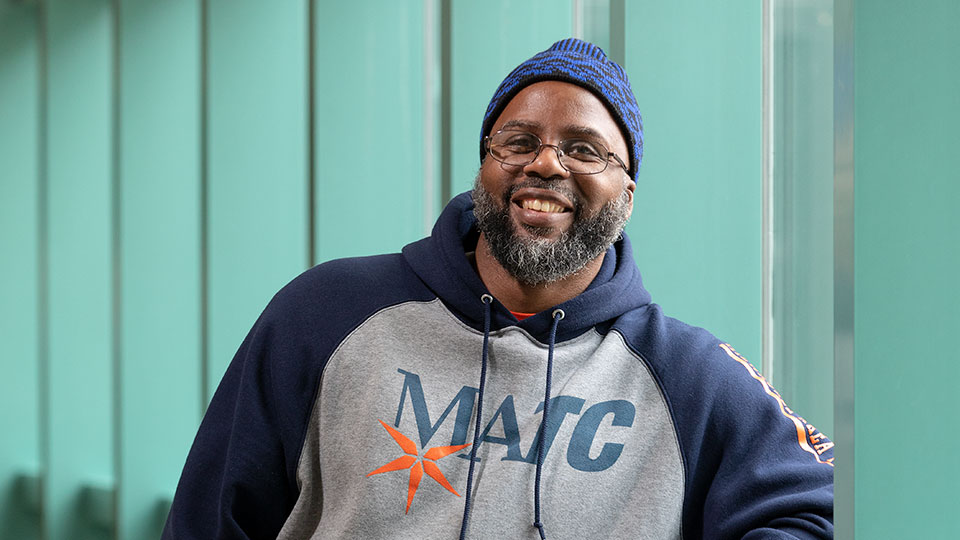
James E. Watkins, MATC alumnus and Marquette University course co-facilitator.
Focused on the future that would begin the day his sentence ended, James E. Watkins read, wrote and studied as much as he could. He earned horticulture credentials and nearly 30 liberal arts credits while incarcerated in Illinois.
A few months after his release in 2013, he moved to Milwaukee and enrolled at MATC to continue his associate degree coursework.
In January 2020, Watkins began paying it forward by working for Marquette University as a course co-facilitator. The philosophy class blends Marquette students taught by Theresa Tobin, Ph.D., and incarcerated students taking an online art course taught by MATC instructor Thomas Haslett.
Successful second chances
Under the U.S. Department of Education’s Second Chance Pell pilot program, MATC is Wisconsin’s only higher education institution that can issue need-based Pell grants to provide instruction to people in prison. The grants fund their postsecondary education in preparation for reentry into the workforce. Nearly 300 students at 11 Wisconsin Department of Corrections adult institutions have participated in the associate degree program and there is an 80% course completion rate.
The Understanding Art course is part of the fine arts requirement in both the Associate of Arts and Associate of Science transfer degree programs, which provide a path to a four-year bachelor’s degree. “I am proud to be part of the student’s journey of getting on with life,” said Haslett, who also taught the class in 2019.
The incarcerated students do not have internet access and have limited access to a computer. Coursework is uploaded digitally through a learning management system, with assistance from educational coordinators at the facilities.
I am proud to be part of the student’s journey of getting on with life.
“The students are very reflective and engaged. Their writing is powerful and insightful,” Haslett said. Blending the incarcerated students and Marquette University students to complete group projects will help each participant “see the world through different cultural perspectives and further develop critical thinking skills.”
Marquette University collaboration
Marquette’s Dr. Tobin met Watkins in 2019 when he was an MATC student who took her philosophy course, Narrating Freedom: Gender, Race and Mass Incarceration. Marquette provided tuition scholarships to Watkins and two other MATC students who were formerly incarcerated. The class alternated meeting at Marquette and MATC.
For Watkins, the experience provided another step toward his goal of attaining a bachelor’s degree. “The class was dynamic, relevant and fresh,” he said. “Discussions were always respectful, even though different positions on issues were taken and the students were of different backgrounds.”
MATC Associate Dean Julie Ashlock, Ed.D., who helped plan the MATC-Marquette collaboration, noted that Watkins’ perspectives on the course’s topics were enlightening and compelling. She looks forward to seeing the projects completed jointly by the Marquette and incarcerated students. “By sharing their work back and forth, in written and visual narratives, the students are engaging in a dialogue,” Ashlock said.
“Everyone learning from each other helps break down barriers,” Haslett added. “Art is communal. We see how we’re the same and how we’re different.”
To explore hiring students completing reentry programs, contact MATC’s Correctional Education Coordinator at 414-297-7137 or windhad1@matc.edu.

